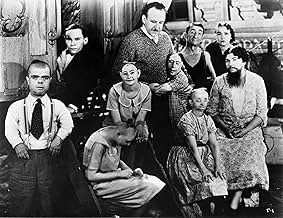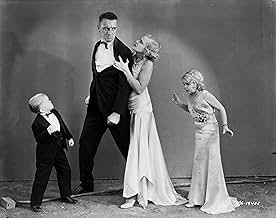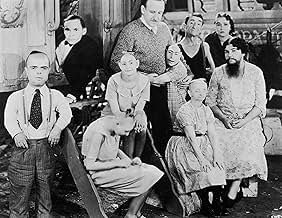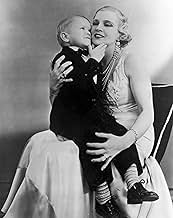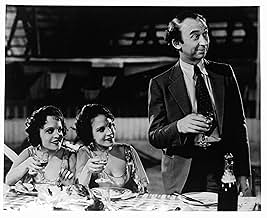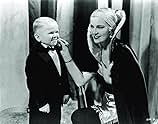CALIFICACIÓN DE IMDb
7.8/10
53 k
TU CALIFICACIÓN
Una bella trapecista acepta casarse con el cabecilla de los artistas secundarios, pero sus deformes amigos descubren que solo se quiere casar con él por su herencia.Una bella trapecista acepta casarse con el cabecilla de los artistas secundarios, pero sus deformes amigos descubren que solo se quiere casar con él por su herencia.Una bella trapecista acepta casarse con el cabecilla de los artistas secundarios, pero sus deformes amigos descubren que solo se quiere casar con él por su herencia.
- Dirección
- Guionistas
- Elenco
- Premios
- 2 premios ganados y 1 nominación en total
Roscoe Ates
- Roscoe
- (as Rosco Ates)
Prince Randian
- The Living Torso
- (as Rardion)
Opiniones destacadas
I really dig 1930s horror movies. There's just something special about them that can never be recreated. A lot of it has to do with the talkies being new territory, many of the directors adapting German Expressionist techniques to Hollywood melodrama, and the freedom allowed before the Hayes Code really kicked in. Movies like 'Dracula', 'Frankenstein', 'Bride Of Frankenstein', 'Island Of Lost Souls', 'The Invisible Man' and 'White Zombie' are horror classics which still impress today. I wonder whether anyone will be watching the lame horror movies of today in seventy years for any other reason than some cheap laughs? Todd Browning made the transition from silent movies and directed the hugely successful 'Dracula' in 1931. It was a sensation and made Bela Lugosi a horror icon. Browning could pretty much do anything he chose after that. He chose to do 'Freaks'. Great for us as, not so great for him. The movie was universally reviled and even banned in some countries and his career never fully recovered. But 'Freaks' is an extraordinary movie with a lot of heart. It has faults, sure - some corny acting at times, and not so great production values - but it really doesn't matter. I don't know anyone who's seen it who hasn't been deeply affected by it. The reason the movie caused such a negative reaction back in the 1930s was because it used real circus performers including Zip the Pinhead and Radian "The Living Torso". Many people found this to be distasteful and exploitative, but the performers seemed to be glad to get the opportunity to work, and the whole crux of the movie is that the "freaks" are more decent than the "normal" Cleopatra (Olga Baclanova) , the trapeze artist who marries little person Hans (Harry Earls) for his money. 'Freaks' is still a very powerful and unique movie. It has inspired many creative people over the years from the Surrealists to The Ramones to Jodorowsky to David Lynch. 'Freaks' comes with my highest recommendation!
In the first place, this movie was originally made to compete with the Universal Horror films, as though these human beings who are the titular "freaks" are not human. Director Tod Browning was still reeling from the loss of his big star, Lon Chaney, to cancer, and thought this would be a good follow up to his previous horror films without Chaney. And after all, he had just finished directing Dracula.
Actually, it paints a very sympathetic picture of the disabled and deformed circus performers, who, at this time of limited medical knowledge and abounding prejudice, were very limited in what they could do in life. They have a very deep camaraderie that is shown through such events as the birth of a child to the bearded lady and the engagement of one of the conjoined twins. Since the other twin is already married, there is much arguing over what the logistics are going to be in these two marriages.
The actual "monsters" in this film are the acrobat "Cleopatra" (Olga Baclanova), and strong man Hercules (Henry Victor), who are having an affair. Two physical specimens with monstrous morality. When the dwarf Hans is captivated by Cleopatra's beauty, she at first teases him by leading him on. But then he starts giving her expensive jewelry and she decides to keep up the ruse. When Freida, Hans' dwarf girlfriend, comes to Cleopatra and asks her to stop teasing him, she accidentally tips off Cleo to the fact that Hans has inherited a great fortune. Hercules and Cleo then plan to get Hans to marry Cleo and then poison him so she can inherit his money. But the two don't realize the close strong bond that the circus performers have with one another and that they are literally each others eyes and ears. Complications ensue.
The film was originally set to run at 90 minutes, but test audiences were so revolted that 30 minutes were cut out so that the remaining film only runs at an hour. Then a scene was tacked on at the end to show Hans' grief over what has ultimately happened. MGM would often add an end scene that really didn't fit the mood of the rest the film during Irving Thalberg's reign there to wrap things up.
This film pretty much finished the career of director Browning as afterwards he only directed a farcical sound remake of a silent film he had made at MGM and one other film and then retired. This was a good late role for Olga Baclanova. She had a very thick Russian accent and had some great late silent roles at Paramount, but talking film had not been kind to her career. This really gave her one last great role where her accent really fit into the plot, plus this was not a film where lots of dialogue was called for, and she was very good at using gestures and expressions to convey emotion.
In the 1960s this film got a fresh look, and today is widely celebrated as having been ahead of its time. The horror is implied and left up to your imagination as to just HOW it happened, and the empathy shown the circus performers is profound. It even got a separate DVD release with commentary.
Actually, it paints a very sympathetic picture of the disabled and deformed circus performers, who, at this time of limited medical knowledge and abounding prejudice, were very limited in what they could do in life. They have a very deep camaraderie that is shown through such events as the birth of a child to the bearded lady and the engagement of one of the conjoined twins. Since the other twin is already married, there is much arguing over what the logistics are going to be in these two marriages.
The actual "monsters" in this film are the acrobat "Cleopatra" (Olga Baclanova), and strong man Hercules (Henry Victor), who are having an affair. Two physical specimens with monstrous morality. When the dwarf Hans is captivated by Cleopatra's beauty, she at first teases him by leading him on. But then he starts giving her expensive jewelry and she decides to keep up the ruse. When Freida, Hans' dwarf girlfriend, comes to Cleopatra and asks her to stop teasing him, she accidentally tips off Cleo to the fact that Hans has inherited a great fortune. Hercules and Cleo then plan to get Hans to marry Cleo and then poison him so she can inherit his money. But the two don't realize the close strong bond that the circus performers have with one another and that they are literally each others eyes and ears. Complications ensue.
The film was originally set to run at 90 minutes, but test audiences were so revolted that 30 minutes were cut out so that the remaining film only runs at an hour. Then a scene was tacked on at the end to show Hans' grief over what has ultimately happened. MGM would often add an end scene that really didn't fit the mood of the rest the film during Irving Thalberg's reign there to wrap things up.
This film pretty much finished the career of director Browning as afterwards he only directed a farcical sound remake of a silent film he had made at MGM and one other film and then retired. This was a good late role for Olga Baclanova. She had a very thick Russian accent and had some great late silent roles at Paramount, but talking film had not been kind to her career. This really gave her one last great role where her accent really fit into the plot, plus this was not a film where lots of dialogue was called for, and she was very good at using gestures and expressions to convey emotion.
In the 1960s this film got a fresh look, and today is widely celebrated as having been ahead of its time. The horror is implied and left up to your imagination as to just HOW it happened, and the empathy shown the circus performers is profound. It even got a separate DVD release with commentary.
Don't let people convince you that "Freaks" is a horror movie, because it isn't. It's actually a quite sad and sympathetic look at the way abnormalities were treated in the early part of the 20th century, and has direct parallels to the obsession with physical perfection causing eating disorders today. Tod Browning of course asks us to consider who are the bigger freaks: those with deformed bodies or those with deformed souls? The two "normal" people who are out to cheat and steal are monstrous, whereas the freaks are quite likable and charming. The ending is disturbing to be sure, but it's hard to condemn the freaks for acts that seem largely justified.
Is it a coincidence that in several shots showing Cleopatra reclining on a sofa, she appears to be deformed herself (in one shot it looks as if she has no legs). Has anybody else noticed this? "Freaks" was obviously way ahead of its time. There's a very interesting documentary on the DVD about its reception in 1932; it bombed and pretty much ruined Browning's career. Thank God that the general public is not allowed to be the final arbiter of a film's value. Think how many priceless films we would have lost by now if that were the case.
Grade: A
Is it a coincidence that in several shots showing Cleopatra reclining on a sofa, she appears to be deformed herself (in one shot it looks as if she has no legs). Has anybody else noticed this? "Freaks" was obviously way ahead of its time. There's a very interesting documentary on the DVD about its reception in 1932; it bombed and pretty much ruined Browning's career. Thank God that the general public is not allowed to be the final arbiter of a film's value. Think how many priceless films we would have lost by now if that were the case.
Grade: A
The subject of human disability is still a taboo subject in Cinema, even over 70 years since this film's release.
It's difficult to imagine what impact this film would have had in the 1930's, but as it still has the ability to shock ( through the images of bodily deformity ) I can understand why many shunned and disowned this work, and why it totally ruined Todd Browning's film career.
The basic premise - that beauty is more than skin deep - can appear to be wielded with a sledgehammer, but perhaps the contemporary audience needed to be hit harder in order to make them understand the point.
The film is short ( due to enforced cuts ), and at times can move rather slowly and can appear rather 'stagey' which is a trait of many films from the 20's / 30's.
But don't let that put you off. The plot is simple, but it's the telling of the story rather than the story itself that is important. And you really do need to remind yourself that these are real people - not actors - and this was the live they led.
I rate it 9 outa 10 because they really don't make them like this any more.
It's difficult to imagine what impact this film would have had in the 1930's, but as it still has the ability to shock ( through the images of bodily deformity ) I can understand why many shunned and disowned this work, and why it totally ruined Todd Browning's film career.
The basic premise - that beauty is more than skin deep - can appear to be wielded with a sledgehammer, but perhaps the contemporary audience needed to be hit harder in order to make them understand the point.
The film is short ( due to enforced cuts ), and at times can move rather slowly and can appear rather 'stagey' which is a trait of many films from the 20's / 30's.
But don't let that put you off. The plot is simple, but it's the telling of the story rather than the story itself that is important. And you really do need to remind yourself that these are real people - not actors - and this was the live they led.
I rate it 9 outa 10 because they really don't make them like this any more.
"Freaks" is one of the most controversial horror films from the 30's,mainly because director Tod Browning hired as the actors real sideshow freaks.It does have a rather unsettling effect,but I think that really does work for the film.Browning builds up a great amount of suspense with the good use of locations,story and lots of atmosphere.The ending,where we see freaks crawling in the mud,is pretty creepy.Anyway check this one out-it's worth watching.
¿Sabías que…?
- TriviaThe on-screen romance between Hans and Frieda was very subdued because the roles were being played by real life brother and sister Harry Earles and Daisy Earles.
- ErroresAt 43:40 when Cleo tosses the wine at Angeleno, she is standing in front of him, but the wine she throws comes from the far right side of the frame.
- Citas
Freaks: We accept you, one of us! Gooble Gobble!
- Versiones alternativasReissue prints included a two-and-a-half minute written prologue about historical interpretations and contemporary studies of "misshapen misfits." These same prints remove the MGM Lion (the studio having disowned the film for many years).
- ConexionesEdited into Histoire(s) du cinéma: Le contrôle de l'univers (1999)
Selecciones populares
Inicia sesión para calificar y agrega a la lista de videos para obtener recomendaciones personalizadas
Detalles
Taquilla
- Presupuesto
- USD 310,607 (estimado)
- Total a nivel mundial
- USD 4,693
- Tiempo de ejecución
- 1h 4min(64 min)
- Color
- Relación de aspecto
- 1.37 : 1
Contribuir a esta página
Sugiere una edición o agrega el contenido que falta


